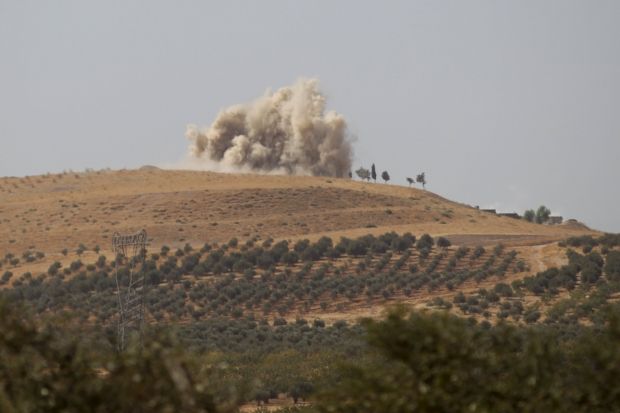
A briefing referring to such a scenario — drawn up by British diplomats and intelligence chiefs and intended for only the highest levels of government — appears to describe many of the latest developments in Syria's bloody civil war, in which Russia intervened last month, Sam Jones in London wrote in his article titled "When Britain foresaw Russia's Syria role" published on October 23.
But the note was written in September 1957, intended for Harold Macmillan, then prime minister. Focusing on how the Kremlin could respond to U.S. attempts at regime change in Damascus, it serves to underline how just long Moscow has seen Syria as a strategic asset and the depth of Russian opposition to U.S. "meddling" in the country.
It is also a striking illustration of just how poorly anticipated Russia's actions in Syria in recent weeks were, and how, in geopolitics, it is the long-game that matters.
"Russia would be bound to regard the overthrow of the Syrian regime as involving a serious reverse for them in the Middle East," the note reads, as it set out the ways in which the Kremlin might respond. "They would try to frustrate it by every means short of those which, in their judgment, would be likely to involve them in a war with the West."
Macmillan initialed the note, approving the restriction of its content to an especially tight group. "Yes" he noted, and signed: "HM."
Alongside 400 other formerly classified government intelligence files — covering a swathe of UK domestic and international policies — the top-secret briefing was released by UK authorities to the national archives on Friday, highlighting a historical record that many policymakers in Washington, London and Europe seem to have neglected.
In 1957 amid Western-backed revolutions, military interventions and regime change across the Middle East, Russia had just inked a pact with Syria, initiating the relationships with the country's military leaders that persist to this day.
The U.S. was desperate to depose the regime. Back then, at least, Russia's likely response to meddling in Syria was thought through.
"So much of the thinking about Russia and Syria is superficial and only considers the immediate context," says Fawaz Gerges, professor of international relations at the London School of Economics. "Syria has been pivotal for Russia since the 1950s. What has happened with Russia's actions there recently is not a product of today, it is a product of decades of the Cold War. I don’t call it a Russian intervention, I call it the Russian surge."
Certainly, some things in the British government's secret 1957 file are different from the present day; the configuration of alliances between states in the Middle East then has little resemblance to its current form. Iran was an ally of the West. Israel, which in the 1956 Suez crisis defied the U.S. to ally with Britain and France, now has to contend with a very different diplomatic landscape.
But for the most part — substituting the occasional proper noun — the briefing remains uncannily relevant.
"The Soviets' reaction to the U.S. policy on Syria could be expected to be strong and determined," it says. Part of Russia's actions will be aimed at "improving the situation" for them elsewhere and to "make trouble" for the West where it can, it adds.
And, as if in anticipation of President Vladimir Putin's appearance at the United Nations last month it adds: "Russia will mount a world-wide propaganda campaign depicting Syria as the innocent victim of threatened aggression by the US, United Kingdom and France."

